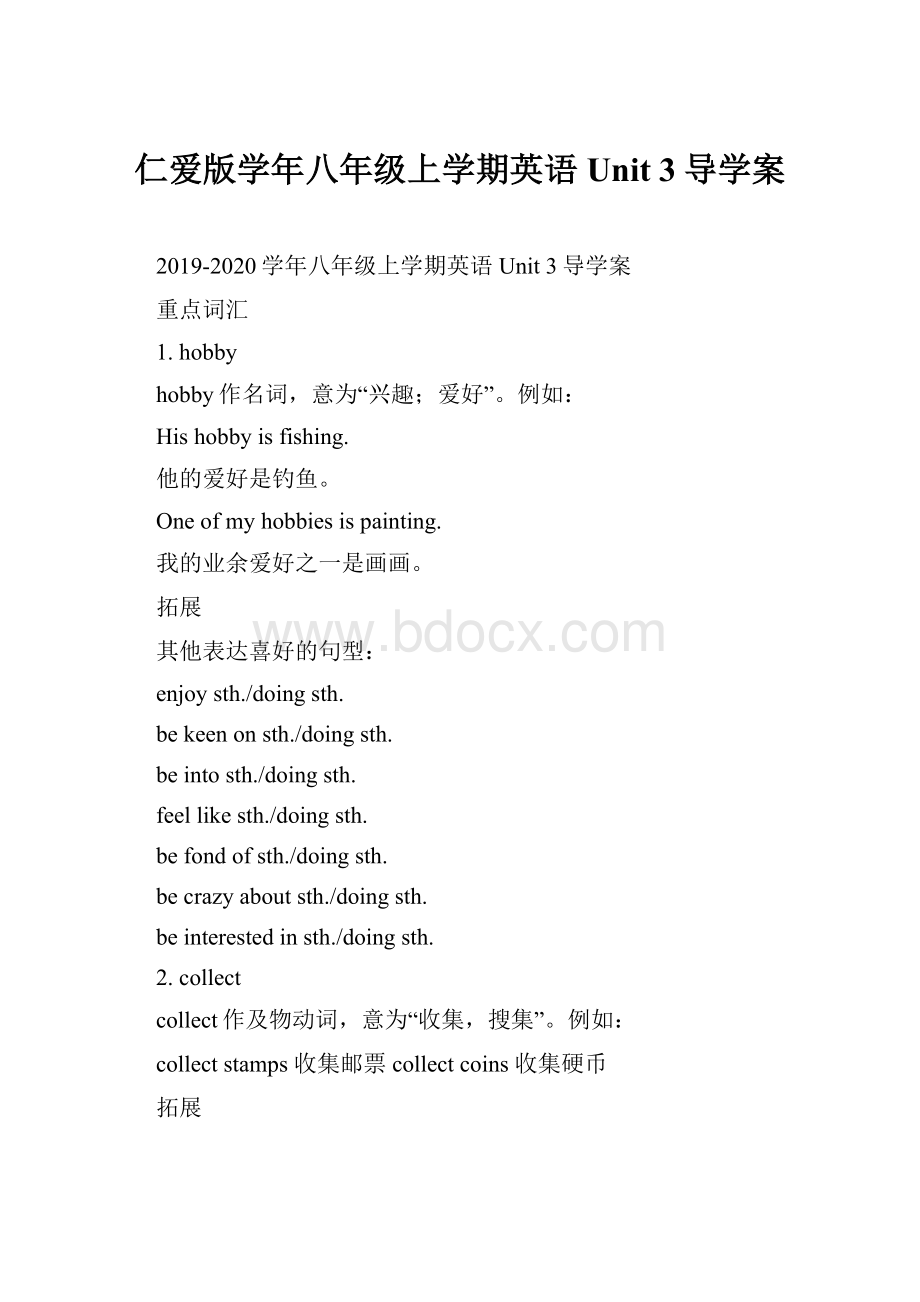仁爱版学年八年级上学期英语Unit 3导学案.docx
《仁爱版学年八年级上学期英语Unit 3导学案.docx》由会员分享,可在线阅读,更多相关《仁爱版学年八年级上学期英语Unit 3导学案.docx(37页珍藏版)》请在冰豆网上搜索。

仁爱版学年八年级上学期英语Unit3导学案
2019-2020学年八年级上学期英语Unit3导学案
重点词汇
1.hobby
hobby作名词,意为“兴趣;爱好”。
例如:
Hishobbyisfishing.
他的爱好是钓鱼。
Oneofmyhobbiesispainting.
我的业余爱好之一是画画。
拓展
其他表达喜好的句型:
enjoysth./doingsth.
bekeenonsth./doingsth.
beintosth./doingsth.
feellikesth./doingsth.
befondofsth./doingsth.
becrazyaboutsth./doingsth.
beinterestedinsth./doingsth.
2.collect
collect作及物动词,意为“收集,搜集”。
例如:
collectstamps收集邮票collectcoins收集硬币
拓展
(1)collection作名词,意为“收藏品、收集物”。
是动词collect的名词形式,是由动词collect加后缀-tion变化来的。
Thesearemycollections.这些是我的收藏品。
Mybrotherhasaverygoodcollectionofstamps.我的弟弟收集了许多邮票。
(2)collector作名词,意为“收藏家”。
例如:
Markisafamousstampcollector.Mark是一位著名的邮票收藏家。
3.cut
(1)cut作动词,意为“切;割;剪;削减”。
过去式及过去分词形式与原形相同,也是cut。
例如:
Thisknifeisnotsharpenoughtocutthesteak.
这把刀子不够利,无法切牛排。
Don’tcutyourfingeronthebrokenglass.
别让碎玻璃割伤你的手。
Faceround,please,sothatIcancutyourhairattheback.
转一下头,好让我可以剪你后面的头发。
Pleasecutouttheexpenseinordertosavethemoney.
为了节省钱,请削减开支。
(2)cut作名词,意为“切口;式样;剪辑”。
例如:
Hischeekwasbadlyscarredbyaknifecut.
他的面颊上留有严重的刀疤。
Idon’tlikethecutofhisnewsuit.
我不喜欢他那套新衣服的式样。
Beforethisplayisbroadcastseveralcutsmustbemade.
这个剧目播出前必须经过数次剪辑。
4.lend
lend作及物动词,意为“借给,借出”,表示“自己”借给“他人”。
常用结构有:
lendsb.sth.或lendsth.tosb.借给某人某物。
例如:
Canyoulendmeyourruler?
=Canyoulendyourrulertome?
把你的尺子借给我好吗?
探究
lend
借出,借给
表示把东西借给他人
常用搭配:
lendsb.sth.或lendsth.tosb.
borrow
借入,借来
表示从他人那借来
常用搭配:
borrowsth.fromsb.
例如:
SheborrowsanEnglishdictionaryfromherclassmateandlendsapentoherfriend.
她向同学借了一本字典,并把一支钢笔借给了朋友。
5.wonder
(1)wonder作名词,意为“惊奇;奇迹”。
例如:
Theywerefilledwithwonderatthenewwaterfall.
他们对新瀑布感到非常惊奇。
Colourtelevisionisreallyawonder.
彩色电视真是一个奇迹。
(2)wonder作动词,意为“惊奇;想知道;怀疑”。
例如:
Ishouldn’twonderifhewinstheprize.
如果他获奖,我不会感到惊奇。
Iwonderifthispicturecanberestored.
我很想知道这幅画能否修复。
Iwonderifyouhavesomuchtimetodosomuchwork.
我怀疑你是否有那么多时间去做那么多工作。
6.understand
understand作动词,意为“懂得;明白;理解;认识到;听说;获悉”,understood是其过去式及过去分词形式。
例如:
Heistryinghisbesttounderstandhismeaning.
他正在尽力弄明白他的意思。
Idon’tunderstandwhatyou’retalkingabout.
我不明白你在说什么。
Ifyoucan’tdoit,Iwillunderstand.
如果你不会做这件事的话,我可以理解。
Idon’tfullyunderstandhisreasonsforleaving.
我不完全理解他离开的理由。
Youmustunderstandthegravityofthesituation.
你必须认识到局势的严重性。
Iunderstandthatyouwillbemovingheresoon.
我听说你就要搬到这儿来住了。
7.agree
agree作不及物动词,意为“同意”,Iagree意为“同意,赞成”,Idon’tagree表示“不赞成某人或某人的观点”,常用于交际用语中。
另外,agree后接不定式,但不能接动名词。
例如:
Sheagreedtolendmethebook.她同意把那本书借给我。
Iagreetomeethimtomorrow.我同意明天见他。
拓展
agreewith和agreeto(to为介词)都表示“同意,赞同”,但后面所接的宾语不同。
agreewith后接指人或表示意见、看法的词;agreeto后接表示建议、计划、安排之类的词。
例如:
Iquiteagreewithyou.我很同意你(的意见)。
DoyouagreewithwhatIhavesaid?
你同意我所说的话吗?
Hehasagreedtooursuggestionabouttheholiday.他已经同意我们度假的建议了。
8.useful
useful作形容词,意为“有用的;有益的”。
例如:
Thedictionaryisveryuseful.
字典是很有用的。
拓展
useful是由动词use后缀“-ful”构成的形容词。
动词后缀“-ful”变成形容词,是一种常见的构词法,类似的这样的词还有很多。
例如:
care→careful;help→helpful。
9.beat
beat作及物动词,有以下用法:
(1)意为“赢;打败;战胜”,后接人或某一团队、组织等,其过去式为beat。
例如:
Ibeathimatlongjumpyesterday.昨天跳远我赢了他。
(2)意为“打;击”,表示连续不断的打击。
例如:
Whoisbeatingthedrum?
谁在打鼓?
(3)表示“(心脏)等跳动”。
例如:
Ifeelmyheartisbeatingfast.我觉得我的心脏在剧烈跳动。
拓展
beat和win都有“赢”的意思,但用法不同:
beat的宾语为人或相当于人的团体、组织;而win的宾语为比赛或某个项目,过去式为won。
例如:
Thoughwewereweak,webeatthem.虽然我们弱,但我们赢了他们。
Whowinthefirstprizeinthecompetition?
谁在比赛中赢得了一等奖?
10.disappear
disappear作动词,意为“消失,消散”。
其反义词是appear,意为“出现”。
例如:
Don’tdisappearagain.不要再消失了。
Someanimalsaredisappearingbecauseofhunting.
一些动物因滥捕而濒临灭绝。
Awomanappearedattheendofthestreet.
一位妇女出现在街道的尽头。
拓展
dis-主要用在动词之前或名词和形容词前,表示相反意义。
例如:
dislike不喜欢;discover发现;disobey不遵守;disbelieve不相信;
disadvantage不利条件;dishonest不诚实的
11.wake与awake
(1)wake意为“醒;叫醒”,它可以用作不及物动词或及物动词,常与副词up连用。
例如:
Whattimedoyouusuallywake(up)?
你通常在什么时候醒来?
Wakeup!
It'seighto’clock.醒醒吧!
已经八点钟了。
(2)awake作动词,表示“醒;弄醒”的意思时,比wake稍微正式些,不如wake常用。
它也可以用作形容词,作表语,意思是“醒着的”。
例如:
Don’tworry!
Ishallawakehimontime.
不用担心!
到时我会叫醒他的。
Isheawakeorasleep?
他醒着还是睡着?
拓展
相关词组:
awaketo(sth.)对某事物醒悟;觉悟;觉察到。
例如:
Areyouawaketothedangeryouarein?
你意识到你自己所处的危险了吗?
12.but与however
but和however都可表示语义上的转折,但用法上有区别:
(1)从语义上看,but所表示的是非常明显的对比,转折的意味比however强。
(2)从语法上看,but是个并列连词,而however却是个副词。
(3)从语序上看,but总是位于它所引出的分句之首,而however却可位于分句之首、之中或之尾,但在翻译成汉语时,一定要把它放在分句之首。
(4)从标点上看,but之后一般不得使用逗号,但however位于分句之首时,通常用逗号;位于分句之中时,通常在其前、后各加一个逗号;位于分句之尾时,则必须在其前加逗号。
例如:
Welovepeace,butwearenotafraidofwar.
我们热爱和平,但是我们并不害怕战争。
Hehasn’tarrived.Hemay,however,comelater.
他还没有到,不过,他可能过一会儿来。
Youcanphonethedoctor.However,IdoubtwhetherhewillcomeoutonaSaturdaynight.
你可以给医生打电话。
不过,我怀疑他是否会在周六晚上出诊。
Hesaidthatitwasso.Hewasmistaken,however.
他说事情是这样的,然而他错了。
即学即用
I.根据汉语或首字母提示补全句子。
1.Heoftengoesswimmingduringsummerv_______.
2.Myfavoritepetisacat.Becauseit’sfunnyandl_______.
3.ChattingontheInternetcanbringushappinessandf_______.
4.—Whotaughtyoutoswim?
—N_______.Itaughtmyself.
5.Lookattheyoungmanwithlighthair.Heissoh_______.
6.Thechildrencanlearnalotof_______(知识)onTV.
7.Whichdoyouprefer,readingor_______(绘画)?
8.Ithinkpigsarereallyvery_______(愚蠢的).
9.Hisfacelooksveryblackand_______(丑陋的),buthisheartisverykindandbeautiful.
10.—Themovieiswonderful.
—Ia_______withyou.
II.用括号中所给单词适当形式填空(每空不限一词)。
1.“Jimpaintswell”meansheisagood_______(paint).
2.—What’syourhobby?
—Ilike_______(collect)coinsverymuch.
3.Hewastakinga_______(show)atthistimelastnight.
4.I_______toworkinacarfactory.
5.Hobbieshelppeoplerelaxaftertheir_______(day)work.
6.Ireallyenjoythemusic.Itsoundsso_______(pleased).
7.Ifeltvery_______(sadly),becausehehurtmydog.
8.Here’ssome_______(use)informationabouttravelinCanada.
9.—Doyouwash_______(dish)athome?
—Yes,butnotoften.
10.Theteachertoldusafunnystory.Allthestudents_______(laugh)happily.
III.根据短文内容及首字母提示在空白处填上适当的单词,使短文意思完整。
LiMingism___1___goodfriend.Hehasmanyh___2___.Heusedtobeamoviefan.Hewenttothemoviet___3___atleasttwiceaweek.SometimesherentedVCDsandw___4___themathome.Hisf___5___moviestarwasJiangWen.
NowLiMingisinterestedinc___6___stamps.Hethinksit’sgreatf___7___.Hecanlearnalotaboutpeople,places,historyandmanyotherthingsf___8___stamps.Someoldstampsareveryv___9___.
LastFridaywasLiMing’sb___10___.Hegotmanystampsfromhisfriends.LiMingwasveryhappy.
参考答案
I.根据汉语或首字母提示完成下列句子。
1.vacations2.lovely3.friendship4.Nobody5.handsome
6.knowledge7.painting/drawing8.stupid9.ugly10.agree
II.用括号中所给单词适当形式填空(每空不限一词)。
1.painter2.collecting3.shower4.used5.daily
6.pleasant7.sad8.useful9.dishes10.laughed
III.根据短文内容及首字母提示在空白处填上适当的单词,使短文意思完整。
1.my2.hobbies3.theater4.watched5.favorite6.collecting7.fun8.from9.valuable10.birthday
重点句型
1.MaybeIneedachange.
maybe作副词,主要用于非正式场合,口语中常用,意为“也许,大概”。
它通常放在句子的开头,在句子中作状语。
例如:
Maybetheywon’tcomeheretonight.他们大概今晚不会来这儿。
Maybesheishappy.也许她是幸福的。
拓展
maybe是“情态动词may+动词原形be”构成的,在句中做谓语,意为“可能是、大概是”。
例如:
Shemaybeathome.她可能在家。
(也可以说:
Maybesheisathome.)
Youmayberight.你可能是对的。
(也可以说:
Maybeyouareright.)
2.Iusedtocollectbaseballcards.
usedtodosth.是一个固定结构,意思是“过去经常做某事”,后面用动词原形,表示过去的某种经常性、习惯性的行为或者动作,并意味着这种动作目前已经不存在。
肯定句:
Iusedtoplaywithmyfriendsafterschool.过去放学后我常常和朋友们一起玩。
否定句:
Youdidn’tusetolikepopsongs.=Youusedn’ttolikepopsongs.
你过去不喜欢流行歌曲。
一般疑问句:
Didyoursisterusetobequiet?
=Usedyoursistertobequiet?
你的妹妹过去常常是很安静吗?
therebe句式:
Thereusedtobealotoffishesinthisriver.过去这条小河常常有许多鱼。
拓展
(1)beusedtodosomething意思是“被用来做某事”,是动词短语use…todo的被动语态结构。
例如:
Knivesareusedtocutthings.小刀是用来切东西的。
(2)beusedtodoingsomething意思是“习惯于做某事”,to后接动词-ing形式。
例如:
Myfatherisusedtolivinginthevillage.我爸爸习惯于住在村子里。
3.Allpetsprovidetheirownerswithloveandcomfortintheirlives.
provide为及物动词,意为“提供”。
provide常与介词with或for连用,providesb.withsth.表示“为某人提供某物”,其同意表达为providesth.forsb.。
例如:
TheSunprovidesuswithlightandheat./TheSunprovideslightandheatforus.
太阳给我们提供光和热。
Sheepprovideuswithwool./Sheepprovidewoolforus.
羊供给我们羊毛。
4.Hewasanamazingchild,abornmusician.
amazing作形容词,意为“令人惊叹的;惊人的”,一般用来说明事物的特征。
例如:
Justlookatit.Isn’titamazing?
你看看。
真叫人惊叹!
Itwasamazingthatheknewnothingabouttheevent.
他对这个事件毫不知情,真让人感到诧异。
Hehadaseriesofamazingadventuresafterhewasflusheddownthetoilet.
被冲进马桶后,他经历了一连串的奇妙冒险。
IntheOlympicGames,heranwithamazingspeedandwonthefirstplace.
在奥运会上,他跑得飞快,以惊人的速度赢得了第一。
拓展
英语中,带-ing的形容词,用来形容事物,指某事物的性质、特征,意为“令人……的”“让人……的”,常用事物作主语或作定语修饰物。
而带-ed的是用来形容人的,意为“感到……的”“使人……的”,其主语是人,类似的词有:
boring令人厌烦的interesting令人感兴趣的moving令人感动的
bored(人)感到厌烦的interested(人)感兴趣的moved(人)感动的
tiring令人厌倦的surprising令人惊讶的
tired(人)感到疲倦/累/厌烦的surprised(人)感到惊讶的
5.Butthegirlwasafraidtogohomewithoutsellingoneboxofmatches.
(1)beafraid之后可接不定式,也可接名词、代词或ofdoingsth.表示“害怕做某事”或“不敢做某事”。
例如:
Shewasafraidtotellyou.她害怕告诉你。
Sheisafraidofgoingoutalonelateatnight.她很怕深夜独自外出。
I’mafraidofthedog.我怕狗。
(2)但若要表示担心可能会发生某事,则只能用beafraidofdoing而不能用beafraidtodo。
例如:
I’mafraidofbeinglateforclass.我担心上课迟到。
拓展
beafraid后可接that从句,表示“担心……”。
例如:
Heisafraidthathisfatherwillbeunhappy.
他担心他的爸爸会不高兴。
6.AndthentheyfelttootiredtoworkonMondaymornings.
too…to…意为“太……而不能”。
它在结构形式上是肯定的,但意义上却表示否定含义,所以动词不定式符号to前不能再加not,只接动词原形即可,too后接形容词或副词原形。
例如:
Thebookistoodifficulttounderstand.这本书难于理解。
拓展
(1